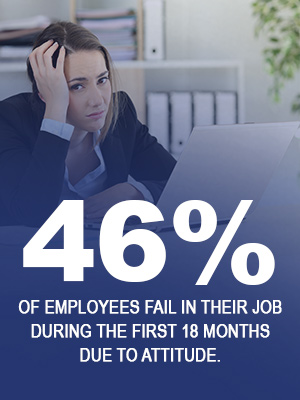In a study done by Leadership IQ, CEO, Mark Murphy and his team followed 20,000 new hires during their first three years of employment. The results were startling: 46% of the participants failed in their job during the first 18 months due to ATTITUDE. 
Nearly 10,000 people in this study didn’t flunk out of excel reports, crash and burn on presentations to customers, or even misplace the dreaded decimal point. No. Their job ended due to how they acted. Further research points to the fact that 89% of employee failure stems from attitudinal issues and only 11% due to a lack of skill. That’s staggering! It’s even more concerning when focus of the talent acquisition process is often on skills and experience. If a typical interview is an hour in length, how much time are you devoting to a confirmation of the skill set on a resume versus delving into the attitude of the person in front of you?
There’s more. There are several things going on right now in this tight labor market that make this concept of attitude even more important than the statistics. One, skills have been commoditized. The rise of Artificial Intelligence (AI) and automation have impacted many skill- based roles in IT, finance, and HR. This means that when you hire for lots of different roles with skills as your primary focus, you may be hiring for something that in short order, may no longer even be part of the job. Another talent- related phenomena tied to attitude over skills is that even in highly skilled positions, nearly 90% of jobs require human interaction, so “how” a person gets results is important in almost every job out there. Additionally, if we say that culture matters, it’s built through the careful selection and fostering of employees by hiring for attitudes that people want to work with and for.
Recently, Mark Murphy gave an impassioned presentation titled, “Why you just might need to fire your best performer”. Mark refers to negative attitude as a cancer that spreads quickly and slows everything else down around it. So, while your top sales person is bringing in cash, you are letting cash flow out of your organization if they are damaging their own team with their toxic attitude. Yet, surprisingly, organizations sacrifice their future on the alar of the immediate but simply declaring, “That’s just employee X being employee X”. In truth, it is harder to remedy a skilled person with a bad attitude because the feedback and coaching that is required is so personal. We would all rather be told that we need to master pivot tables than change our attitude in meetings.
There are things that can be incorporated into the talent selection process that would give clues to a person’s overall attitude at work. In a recent Harvard Business Study, penned by Michael Housman of Cornerstone on Demand and Dylan Minor of Harvard, there are two prevalent attitudes that impact whether someone will be a toxic influence on your business or not: overconfidence and high self- regard. Their study looked at these two traits and determined that not only where they indicative of being a toxic employee on their way into an organization but it also concluded that people with these traits were more likely to become toxic if placed in circumstances that triggered their behavior like a change in circumstances or a shift in strategy. As selection processes become more automated, it might be a good idea to at a minimum, train leaders to ask questions that are designed to drill into the emotional intelligence and attitudinal elements of a candidate’s experience and former performance.
Attitude does matter. Hire for it.
Sources: redbranchmedia.com, business.linkedin.com, business.com, hbs.edu, cnbc.com